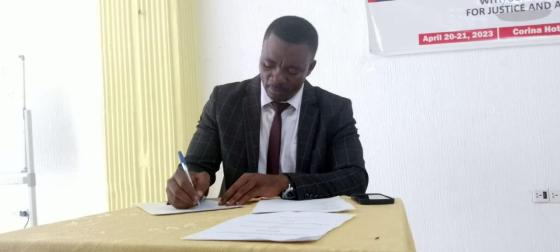Liberia: Calls for War and Economic Crimes Court Intensify

Dempster: “We want human rights defenders and civil society organizations to operate without fear of threats and intimidation and that their efforts be welcomed and supported by the Liberian government and the international community”
— As National Convening of Justice Campaigners, Civil Society, War Victims, and Human Rights Community sign a national resolution
The campaign to end impunity and give justice to war victims and survivors of Liberia’s civil war has now received a significant boost with the signing of a resolution.
The resolution, among other things, calls on the government of Liberia to immediately take all necessary steps to implement the Truth and Reconciliation Commission (TRC) report released in 2009 and request assistance from the international community, including the UN, US, EU, AU, and ECOWAS, for the establishment of the Extraordinary Criminal Court for Liberia.
It also calls on the US Government, through its Embassy and the Office of Global Criminal Justice, to take action to stand with victims by supporting the establishment of a war crimes court for Liberia, through assistance to conduct a needs assessment for setting up a court that can conduct fair, credible trials of civil war-era crimes.
Held under the theme, “We are not surprised: We knew this day would come!” With support from Center for Justice and Accountability, the National Convening of Justice Campaigners, Civil Society, War Victims, and the Human Rights Community on Friday, April 21, concluded a two-day national conference with the signing of a major national resolution on the establishment of the war and economic crimes court in Liberia.
Reading the resolution after a two-day interactive conference, Lead Justice Campaigner Adama K. Dempster called on the international community, including the United Nations and the US Government, to follow up on the policy statement made by President George Weah at the United Nations General Assembly (UNGA) in 2019, that his government was ready to start discussion on the time, venue, and funding support leading to the establishment of a court for Liberia.
Dempster, through the National Strategic Document, encourages a consultative process with the victims and survivors of these crimes and delivers an unequivocal message in support of a war crimes court for Liberia.
He added, "That all efforts be made to emulate actions taken in the region such as the recent trial for the 2009 stadium massacre in Guinea, prosecutions for atrocity crimes in Sierra Leone before the hybrid Special Court for Sierra Leone, the Special Criminal Court in the Central African Republic, and the Extraordinary African Chambers in Senegal to deliver justice against crimes and atrocities including sexual violence, recruitment of child soldiers, torture, summary executions, and massacres of civilians committed over the course of the civil war era that continued to go unpunished."
The Lead Justice Campaigner further wants human rights defenders and civil society organizations to operate without fear of threats and intimidation and that their efforts be welcomed and supported by the Liberian government and the international community.
Josephine Nkrumah, ECOWAS Representative, said despite the dark days in Liberia as a result of the civil unrest, brighter days are ahead for war victims and survivors, making reference to healing.
She said the wheel of justice is slow; it takes time, but that does not mean that there is no justice.
Nkrumah stressed that for justice to prevail, justice campaigners should continue to remain resolute in their desire, focus, and consistency and not give up.
According to her, extending love to war victims and survivors is also critical because it helps in the healing process of national dialogue. She added that the healing process is one of the key steps to the consolidation of peace.
"So, ECOWAS will continue to stand with you and to encourage you to be unwavering in your commitment and in your quest for that peace, not to give up. It is now time Liberia finds its path to healing and reconciliation," Nkrumah pointed out.
Also speaking, John H.T. Stewart, former TRC Commissioner, said the main focus of Liberians has been on the question of prosecution because it affects people who are in power and people who are currently out of power, and together they have invested in the idea that there will be no accountability.
"So the TRC report has been long overdue; over fourteen years have passed, but people are still calling for accountability because there is no guarantee that what happened in the past cannot happen again," he said.
Stewart further added that until they (citizens) can deal with the portion of impunity, Liberia will not be able to go forward in peace because anything can happen; anybody can feel like disagreeing to the point where it will result in violence as a means of setting scores.
Meanwhile, participants at the end of the conference reaffirmed their commitment that they will remain resolute in ensuring that peace and justice, unity, national healing and reconciliation, and the general principles of human rights and protections for women and children continue to permeate Liberian society.
